#muslim writes
Text
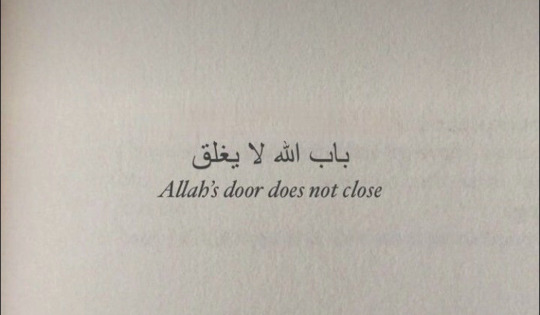
أعمال الله موجودة على الإطلاق ولكنها خفية.
If you find yourself astray, keep this reminder deeply in your heart. Woven into the fabrics of your mind.
Do not fall for the whispers that break your hope of ever returning. Allah has his ways for you to return to him despite your sins and shortcomings.
Like the story of the prostitute who had mercifully been accepted into heaven for feeding a dog, who led the dog? Certainly the decree and mercy of Allah ﷻ that had willed it. The works of Allah are ever-present yet subtle. Concealed…but existing.
Allah’s door does not close; an endless mercy.
— mindofserenity
#mindofserenity#letters to myself#sabr#myreminders#muslim#islam help#welcome to islam#a quote from pinterest#mine#islamic post#writing#islamic reminders#quoteoftheday#life quotes#life#quote#life quote#freedomisntfree#arabic quotes#islamdaily#subhanallah#an endless mercy#quotes#islam#islamic quotes#muslimah#revert#islamicquotes
562 notes
·
View notes
Text
you must be what the poets talk about
2K notes
·
View notes
Text
I don’t usually talk about politics on here, if ever. But it’s been almost six months since the conflict in the Middle East flared up again, and I’m finally ready to start. Here are some of my thoughts.
I say ‘flared up’ because this has happened before and it’ll happen again. Because, even though what's currently going on is absolutely unprecedented, those of us who live in this part of the world are used to it. Let that sink in: we are used to this. And we shouldn’t have to be.
But I use that term for another reason: I don't want to accidentally call it the wrong thing lest I come under fire for being a genocidal maniac or a terrorist or a propaganda machine, etc., etc.—so let’s just call it ‘the war’ or ‘the conflict.’ Because that’s what it is. Doesn’t matter which side you’re on, who you love, or who you hate.
This post will, in all likelihood, sit in my drafts forever. If it does get posted, it certainly won’t be on my main, because I'm scared of being harassed (spoiler: she posted it on her main). I hate admitting that, but honestly? I’m fucking terrified.
I also feel like in order for anything I say on here (i.e. the hellscape of the internet) to be taken seriously, I have to somehow prove that a) I’m “educated” enough to talk about the conflict, and b) that my opinion lines up with what has been deemed the correct one. So, tedious and unnecessary though it is, I will tell you about my experience, because I have a feeling most of the people reading this post are not nearly as close to what’s happening as I am.
How do I explain where I live without actually explaining where I live? How do I say “I live in the Red Zone of international conflicts” without saying what I actually think? How do I convey the fear that grips me when I try to decide between saying “I live in Palestine” and “I live in Israel”? I don't really know. But I do know that names are important. I also know that, due to the various clickbaity monikers ascribed to the conflict, it would probably just be easier to point to a map.
I haven't always lived in the Middle East. I've lived in various places along America’s east coast, and traveled all over the world. But in short, I now live somewhere inside the crudely-drawn purple circle.
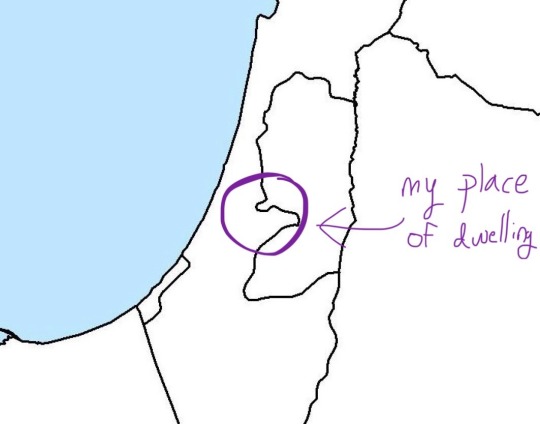
If you know anything about these borders you probably blanched a bit in sympathy, or maybe condolence. But in truth, it’s a shockingly normal existence. I don't feel like I've lived through the shifting of international relations or a war or anything. I just kind of feel like I did when COVID hit, that dull sameness as I wondered if this would be the only world-altering event to shape my life, or if there would be more.
I've been told that, in order for my brain to process all the horrific details of the past six months, there needs to be some element of cognitive dissonance—that falling into a sort of dissociative mindset is the only way to not go insane under the weight of it all. I think in some ways that’s true. I have been terrifyingly close to bus stop shootings when my commute wasn’t over; I have felt my apartment building shake with the reverberations of a missile strike; I have spent hours in underground shelters waiting for air raid sirens to stop.
But. I have also gone grocery shopping, and skipped class, and stayed up too late watching TV, and fed the cats on the street corner, and cried over a boy, and got myself AirPods just because, and taken out the trash, and done laundry on a delicate cycle, and bought overpriced lattes one too many days a week. I have looked at pretty things and taken out my phone because, despite it all, I still think that life is too short not to freeze the small moments.
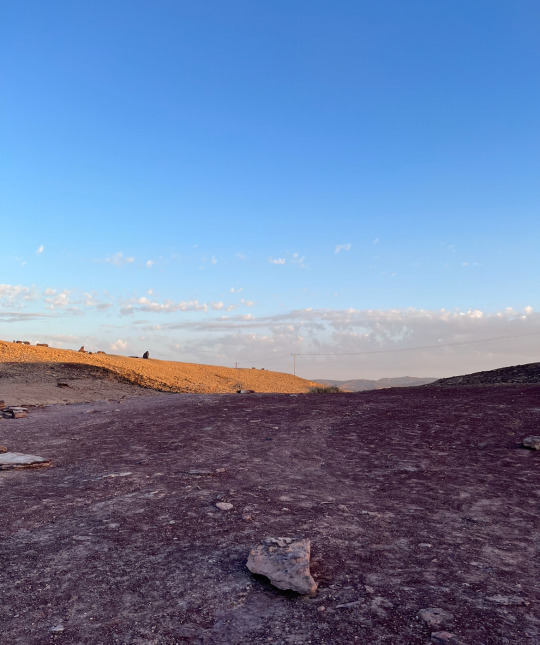
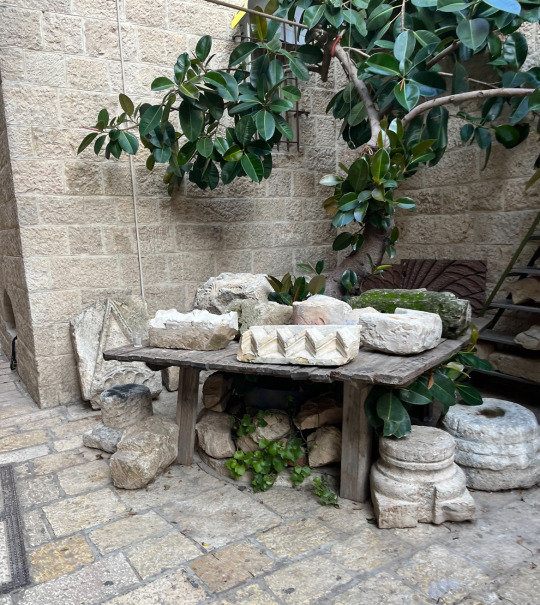
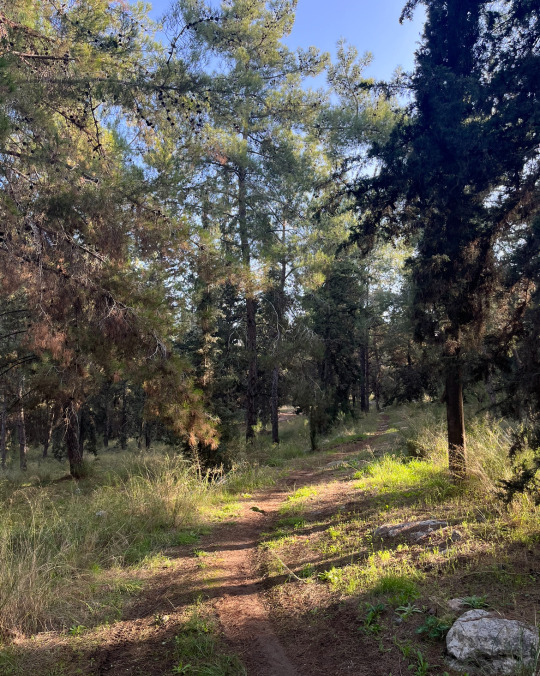
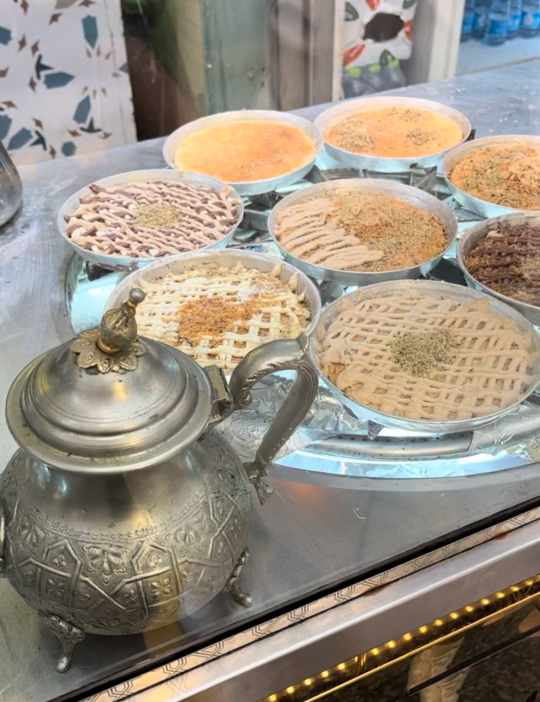
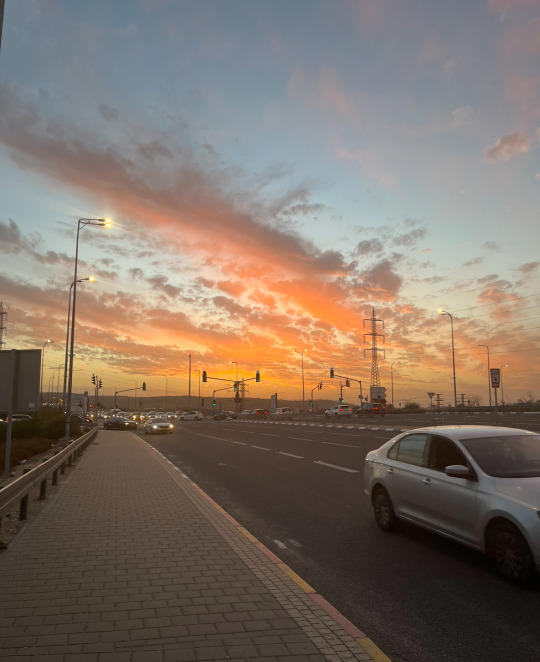
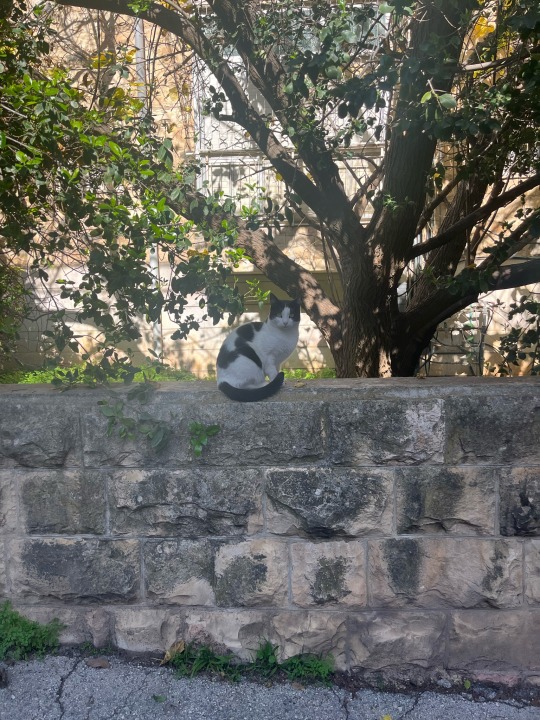
So I'd say, all things considered, I live an incredibly privileged life—compared, of course, to those suffering in Gaza—one filled with sunsets and over-sweetened knafeh and every different color of sand. One that allows me to throw myself into a fandom-induced hyperfixation (or, alternatively, escape method) as I sit on the couch and crack open my laptop to write the next chapter of the fic I'm working on.
But there are bits of not-normalness that wheedle their way through the cracks. I pretend these moments are avoidable, even if they’re not.
They look like this: reading the news and seeing another idiotic, careless choice on Netanyahu’s part and groaning into my morning coffee. Watching Palestinian and Jewish children’s needless suffering posted on Instagram reels and feeling helpless. Opening my Tumblr DMs to find a message telling me to exterminate myself for reblogging a post that only seems like it’s about the war if you squint and tilt your head sideways.
These moments look like all the tiny ways I am reminded that I'm living in a post-October seventh world, where hearing a car backfire makes me jump out of my skin and the sound of a suitcase on pavement makes me look up at the sky and search for the war planes. They look like the heavy grief that is, and also isn’t, mine.
Here's the thing, though. I know you’re wondering when the ball will drop and my true opinion will be revealed. I know you’re waiting for me to reveal what demographic I'm a part of so that you, dear reader, can neatly slap a label on my head and sort me into some oversimplified category that lets you continue to think you understand this war.
No one wants to sit and ruminate on the difficult questions, the ones that make you wonder if maybe you’ve been tinkered with by the propaganda machine, if you might need to go back on what you’ve said or change your mind. We all strive for our perception of complicated issues to be a comfortable one.
But I know that no matter what I do, there will always be assumptions. So, while I shudder to reveal this information online, I think that maybe my most significant contribution to this meta-discussion spanning every facet of the internet is this:
I am a Jew.
Or, alternatively, I am: Jewish, יהודית, يَهُودِيٌّ, etc. Point is, I come from Jews. And, like any given person, I am a product of generation after generation of love.
I'm not going to take time to explain my heritage to you, or to prove that before all the expulsions and pogroms, there was an origin point. If you don’t believe that, perhaps it’s less of a factual problem and more of an ‘I don’t give weight to the beliefs of indigenous people’ problem. But, in case you want to spend time uselessly refuting this tiny point in a larger argument, you can inspect the photos below (it’s just a small chunk of my DNA test results). Alternatively, you can remember that interrogating someone in an attempt to make their indigeneity match your arbitrary criteria is generally not seen as good manners.
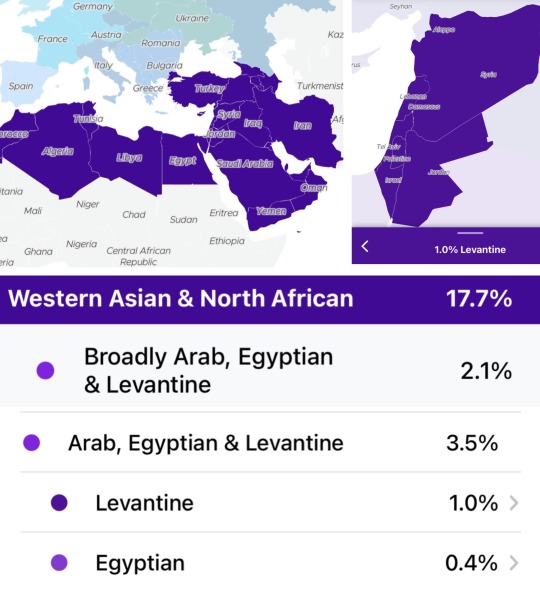
Now, let’s go back to thathateful message (read: poorly disguised death threat) I received in my Tumblr DMs. I think it was like two or three weeks ago. I had recently gained a new follower whose blog’s primary focus was the fandom I contribute to, so I followed them back. I saw in my notes that they were going through my posts and liking them—as one does when gaining a new mutual. Yippee!
Then they sent me this:
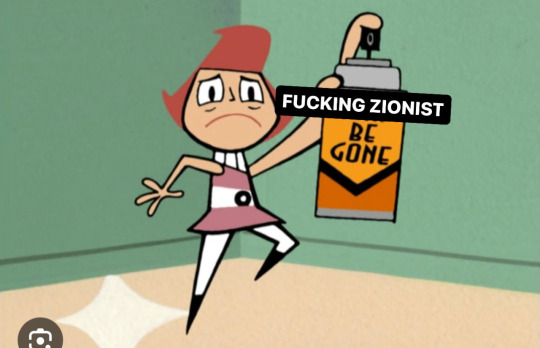
I tried to explain that hate speech is not a way to go about participating in political discourse, but the person had already blocked me immediately after sending that message. Then, assured by the fact that I surely would never see them complaining about me on their blog (because, as I said, they blocked me), they posted a shouting rant accusing me of sympathizing with colonizing settlers and declaring me a “racist Zionist fuck.” Oh, the wonders of incognito tabs.
Where this person drew these conclusions after reading my (reblogged) post about antisemitism…. I'm not actually sure. But I greatly sympathize with them, and hope that they weren’t too personally offended by my desire to not die.
For a while I contemplated this experience in my righteous anger, and tried to figure out a way to message this person. I wanted to explain that a) seeing a post about being Jewish and choosing to harass the creator about Israel is literally the definition of antisemitism and b) that sending a hateful DM and refusing to be held accountable is just childish and immature. But I gave up soon after—because, honestly, I knew it wasn’t worth my effort or energy. And I knew that I wouldn't be able to change their mind.
But I still remember staring at that rather unfortunate meme, accompanied by an all-caps message demanding for me to Free Palestine, and thinking: the post didn’t even have any buzzwords. I remember the swoop of dread and guilt and fear. I remember wondering why this kind of antisemitism felt worse, in that moment, than the kind that leaves bodies in its wake.
I remember thinking, I don’t have the power to free anyone.
I remember thinking, I’m so fucking tired.
And before you tell me that this conflict isn’t about religion—let me ask you some questions. Why is it that Israel is even called Israel? (Here’s why.) Why do Jews even want it? (Here’s why.) But also, if you actually read the charters of Islamist terrorist organizations like ISIS, Hamas, and Hezbollah (among others), they equate the modern state of Israel with the Jewish people, and they use the two entities interchangeably. So of course this conflict is religious. It’s never been anything but that.
But I do wonder, when faced with those who deny this fact: how do I prove, through an endless slew of what-about-isms and victim blaming, that I too am hurting? How do I show that empathy is dialectical, that I can care deeply for Palestinians and Gazans while also grieving my own people?
There's this thing that humans do, when we’re frustrated about politics and need to howl our opinions about it into the void until we feel better. We find like-minded souls, usually our friends and neighbors, and fret about the state of the world to each other until we’ve gone around in a satisfactory amount of circles. But these conversations never truly accomplish anything. They’re just a substitute, a stand-in catharsis, for what we really wish we could do: find someone who embodies the spirit of every Jew-hating internet troll, every ignorant justifier of terrorism, and scream ourselves hoarse at them until we change their mind.
But, of course, minds cannot be changed when they are determined to live in a state of irrational dislike. In Judaism, this way of thinking has a name: שנאת חינם (sinat hinam), or baseless hatred. It's a parasite with no definite cure, and it makes people bend over backwards to justify things like the massacre on October seventh, simply because the blame always needs to be placed on the Jews.
So when a Jew is faced with this unsolvable problem, there is only one response to be had, only one feeling to be felt: anger. And we are angry. Carrying around rage with nowhere to put it is exhausting. It's like a weight at the base of our neck that pushes down on our spine, bending it until we will inevitably snap under the pressure. I’m still waiting to break, even now.
I wish I could explain to someone who needs to hear it that terrorism against Israelis happens every single day here, and that we are never more than one degree of separation away from the brutal slaughter of a friend, lover, parent, sibling. I wish it would be enough to say that the majority of Israelis (which includes Arab-Israeli citizens who have the exact same rights as Jewish-Israelis) wish for peace every day without ever having seen what it looks like.
I wish I could show the world that Israel was founded as a socialist state, that it was built on communal values and born from a cluster of kibbutzim (small farming communities based on collective responsibility), and that what it is now isn’t what its people stand for.
I wish the world could open their eyes to what we Israelis have seen since the beginning: that Hamas is the enemy, Hamas is the one starving Palestinians and denying them aid, Hamas is the one who keeps rejecting ceasefire terms and denying their citizens basic human rights. Hamas is the governing body of Gaza, not Israel. Hamas is responsible for the wellbeing of the Palestinian people. And Hamas are the ones who are more determined to murder Jews—over and over and over again, in the most animalistic ways possible—than to look inwards and see the suffering they’ve inflicted on their own people. I wish it was easier to see that.
But the wishing, the asking how can people be so blind, is never enough. I can never just say, I promise I don't want war.
When I bear witness to this baseless hatred, I think of the victims of October seventh. I think of the women and girls who were raped and then murdered, forever unable to tell their stories. I think of the hostages, trapped underneath Gaza in dark tunnels, wondering if anyone will come for them. I think of Ori Ansbacher, of Ezra Schwartz, of Eyal, Gilad, and Naftali, of Lucy, Rina, and Maia Dee, of the Paley boys, of Ari Fuld and of Nachshon Wachsman. I think of all the innocent blood spilled because of terror-fueled hatred and the virus of antisemitism. I think of all the thousands of people who were brutally murdered in Israel, Jews and Muslims and Christians and humans, who will never see peace.
My ties to this land are knotted a thousand times over. Even when I leave, a part of me is left behind, waiting for me to claim it when I return. But when I see the grit it takes to live through this pain, when I see the suffering that paints the world the color of blood, I look to the heavens and I wonder why.
I ask God: is it worth all this? He doesn't answer. So I am the one, in the end, to answer my own question. I say, it has to be.
Feel free to send any genuine, respectful, and clarifying questions you may have to my inbox!
EDIT: just coming on here to say that I'm really touched & grateful for the love on this post. When I wrote it, I felt hopeless; I logged off of Tumblr for Shabbat, dreading the moment I would turn off my phone to find more hate in my inbox. Granted, I did find some, and responding to it was exhausting, but it wasn’t all hate. I read every kind reblog and comment, and the love was so much louder. Thank you, thank you, thank you. 🤍
Source Reading
The Whispered in Gaza Project by The Center for Peace Communications
Why Jews Cannot Stop Shaking Right Now by Dara Horn
Hamas Kidnapped My Father for Refusing to Be Their Puppet by Ala Mohammed Mushtaha
I Hope Someone Somewhere Is Being Kind to My Boy by Rachel Goldberg
The Struggle for Black Freedom Has Nothing to Do with Israel by Coleman Hughes
Israel Can Defend Itself and Uphold Its Values by The New York Times Editorial Board
There Is a Jewish Hope for Palestinian Liberation. It Must Survive by Peter Beinart
The Long Wait of the Hostages’ Families by Ruth Margalit
“By Any Means Necessary”: Hamas, Iran, and the Left by Armin Navabi
When People Tell You Who They Are, Believe Them by Bari Weiss
Hunger in Gaza: Blame Hamas, Not Israel by Yvette Miller
Benjamin Netanyahu Is Israel’s Worst Prime Minister Ever by Anshel Pfeffer
What Palestinians Really Think of Hamas by Amaney A. Jamal and Michael Robbins
The Decolonization Narrative Is Dangerous and False by Simon Sebag Montefiore
Understanding Hamas’s Genocidal Ideology by Bruce Hoffman
The Wisdom of Hamas by Matti Friedman
How the UN Discriminates Against Israel by Dina Rovner
This Muslim Israeli Woman Is the Future of the Middle East by The Free Press
Why Are Feminists Silent on Rape and Murder? by Bari Weiss
#palestine#israel hamas war#israel hamas conflict#hamas#on war#essay writing#personal essay#rant post#stop terrorism#israel#writing#palestinian lives matter#jewish lives matter#jewish and proud#jewish identity#jewish muslim solidarity#on grief#on religion#antisemitism#anti zionisim#purim 2024#chag purim sameach#judaism#israeli palestinian conflict#am yisrael chai#kvetching#jumblr#the post that turned my blog into an anti-antisemitism blog
700 notes
·
View notes
Text

529 notes
·
View notes
Text
𝑫𝒐 𝒏𝒐𝒕 𝒘𝒆𝒆𝒑 𝒇𝒐𝒓 𝒂 𝒍𝒊𝒇𝒆 𝒕𝒉𝒂𝒕 𝒎𝒂𝒅𝒆 𝒚𝒐𝒖𝒓 𝒉𝒆𝒂𝒓𝒕 𝒘𝒆𝒆𝒑. 𝑱𝒖𝒔𝒕 𝒔𝒂𝒚, "𝑶 𝑨𝒍𝒍𝒂𝒉 𝒄𝒐𝒎𝒑𝒆𝒏𝒔𝒂𝒕𝒆 𝒎𝒆 𝒘𝒊𝒕𝒉 𝒈𝒐𝒐𝒅 𝒊𝒏 𝒕𝒉𝒊𝒔 𝒍𝒊𝒇𝒆 𝒂𝒏𝒅 𝒕𝒉𝒆 𝒉𝒆𝒓𝒆𝒂𝒇𝒕𝒆𝒓." 𝑺𝒂𝒅𝒏𝒆𝒔𝒔 𝒅𝒆𝒑𝒂𝒓𝒕𝒔 𝒘𝒊𝒕𝒉 𝒂 𝑺𝒂𝒋𝒅𝒂𝒉. 𝑯𝒂𝒑𝒑𝒊𝒏𝒆𝒔𝒔 𝒄𝒐𝒎𝒆𝒔 𝒘𝒊𝒕𝒉 𝒂 𝒔𝒊𝒏𝒄𝒆𝒓𝒆 𝑫𝒖'𝒂
- Ibn Qayyim ( رحمة الله )
#islam#deenbot#deenislam#deenoverdunya#writers on tumblr#writing#mindset#islamdaily#writing heals#free palestine#muslim#emaan#deen
276 notes
·
View notes
Text
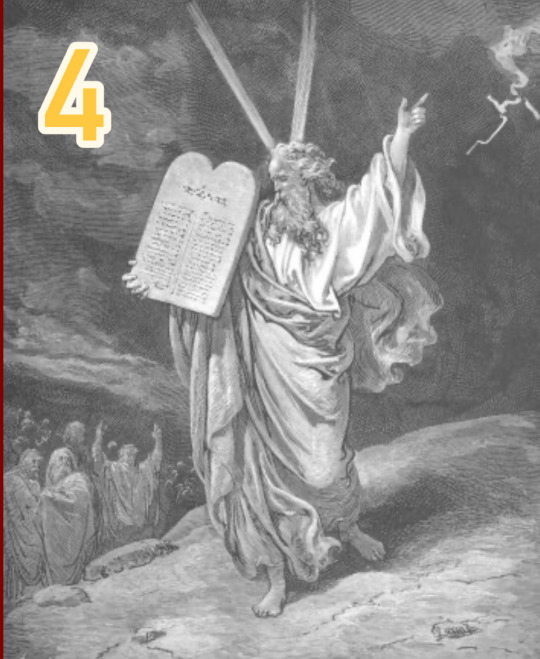
On the 10 Commandments:
——-
The Fourth Commandment Explained
———————
People often still debate the meaning of what God’s Commandments are after the numerous translations. The Orthodox Jewish Bible actually contains the transcript of that speech I gave that day in Shemot 20.
And in my own words: If you do not hold anything else, hold & speak my commandments. Let us review the originals as they were intended- the speech with the teaching summary. Any & all attempts to do harm and/or cause suffering by bypassing the Commandments with “loopholes” will be considered with harsh penalty.
“Remember Yom HaShabbos, to keep it kodesh. Sheshet yamim shalt thou labor, and do all thy work: But the Yom HaShevi’i is the Shabbos of Hashem Eloheicha; in it thou shalt not do any melachah, thou, nor thy ben, nor thy bat, thy eved, nor thy maidservant, nor thy cattle, nor thy ger that is within thy gates; For in sheshet yamim Hashem made Shomayim and Ha’Aretz, the yam, and all that in them is, and rested Yom HaShevi’i; for this reason Hashem blessed Yom HaShabbos, and set it apart as kodesh.”
Shemot 20:8-11 TOJB2011
https://bible.com/bible/130/exo.20.8-11.TOJB2011
Keep at least one good day or Sabbath “set aside” or spiritually different than your other days of the week. Spirituality can mean many things, but ultimately there is an underlying belief that “lifting the soul” or caring for that intangible part of yourself is essential. The intangible is often our intuitions, our feelings, our connectedness to ourselves & the universe & just like how we see that expressed in so many different way across a variety of cultures, Christianity as a practice can also be expressed that way.
You must dedicate at a minimum 1 day out of 7 to rest & having a focus on practices to lift the soul. Your community, anyone that even steps foot near your land as a guest, & those that work with and/or for you must also do the same. That can mean a lot of different practices & not always necessarily the practice of going to church, but ultimately it’s a focus on practices that nourish your soul. God wants you to take care of yourself.
You can find other versions/passages talk about punishment for not holding Sabbath in reverence, but that is for more specific situations. For example, If you claim yourself to be of this God, benefit, and then exploit people by making them work everyday without any rest you will be sinful in God’s eyes.
You have to remember Christianity back when it first was being introduced to people was INCREDIBLY radical in comparison to the way countries were run, the concept of kingship, & it also advocated for the abolishment of slavery.
Many commonly held interpretations of a variety of Christian practices & teachings are a result of the original documents being censored & altered by kings, empires & politics.
It originally was perceived as a disruptive force because it didn’t ask for equality, it demanded it in a tenuous time period of geopolitical instability.
Moses was known as the guy who had freed a bunch of slaves. You really think the political forces that existed during that time frame were really just going to let a “criminal” get up on a public platform & say whatever they want with the risk of him causing more slave uprisings?
Absolutely not. And it changed the world forever.
#christianity#angel#bible#faith#holy bible#holy spirit#writing#jesus#religion#christian faith#moses#abrahamic religions#islamic#islam#israel#muslim#law#justice
177 notes
·
View notes
Text

Advanced Hall Monitor Technique: Go To Detention
[First] Prev <–-> Next
#poorly drawn mdzs#mdzs#wei wuxian#lan wangji#thats not supposed to be lan qiren; just a lan elder#once again wwx tries to play chess (setting up a pin) only for lwj to take the peice and crush it in his mouth#teen wangji is the definition of lawful good. Follow and obey the rules outlined by your [group laws] even at the cost to yourself#lawful good gets done so dirty in media (lawful stupid is usually what the result of trying to write such a character becomes)#but here? nah. LWJ’s severe lawfulness does get used for humour but it does *so* much more too#We get to establish a strong character basis for the fact *he stands by what he beleives in—unshakingly*#idk if anyone is out there saying LWJ moves alignment; cause I’d argue his code of law simply shifts to something (someone) else#regardless; i love this scene a lot for what it shows about lwj’s character and its also such a good character dynamic#oh I forgot to wish everyone a happy first day of spring (north hemmies) and fall (south hemmies)#may the change in season be a blessing B*) not for me though I have seasonal allergies#ramadan started recently too; Ramadan Kareem to all the muslims passing by this blog!
2K notes
·
View notes
Text
the best kinds of love
Love of Allah
Love for Allah
Love for the sake of Allah
291 notes
·
View notes
Text
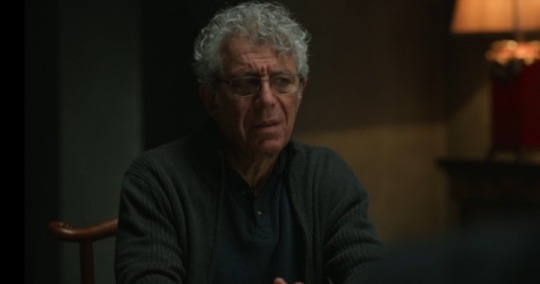




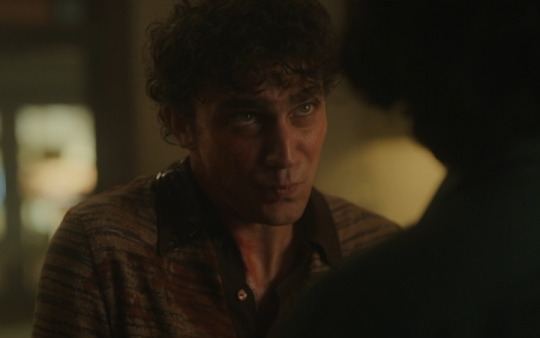
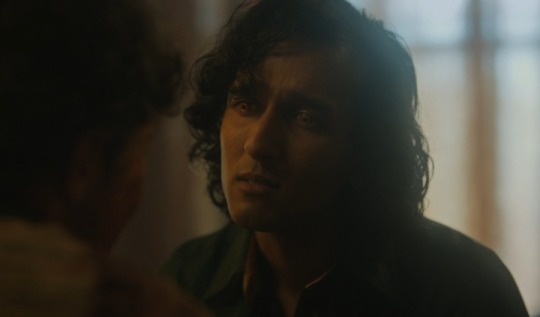



armand & daniel molloy / from the fable of Angel of Death
#interview with the vampire#iwtv meta#iwtv#iwtvedit#iwtvedits#interview with the vampire edits#armand#daniel molloy#armandiel#armandaniel#devil's minion#spreading the muslim armand agenda day one#i feel like armand view himself as the angel of death#that's a whole book i'm about to write but i don't have the energy to expand that on.
111 notes
·
View notes
Text

#myreminders#alhamdulillah#islamic reminders#subhanallah#islam#sabr#quotes#muslim#islamic quotes#muslimah#islam help#hadith#islamic#deen#welcome to islam#islamic post#arabic#writing#life quotes#quoteoftheday
3K notes
·
View notes
Text
It is the first night of Ramadan. Ali makes the same journey that he has for the past 22 years. He walks down the same streets, once filled with the night sounds of children laughing and women chatting, the scent of coffee wafting from cafes that stay open for suhoor, the sight of streetlights and dainty lamps and scattered stars, the feeling of moving along with the hustle and bustle of men rushing towards the call of the adhan. The same streets are now eerily silent, whispers of du’a barely audible, no sound of women or children, not enough men to form a crowd, no electricity to fuel the lights, the cafes and buildings crumbled to rubble and dust, the graveyard of a city that once came to life at night.
Ali prays Tarawih on the ruins of the mosque he grew up in.
It is the fifth night of Ramadan. Ali thinks back to the time he first entered this mosque. At four years old, he walked through the doors, his excitement contained within four stone walls. Rays of sun bounced off of tall windows, casting light onto Ali, running around in circles as his father prayed Asr. Ali remembers climbing onto his father’s back as he went down into sujood; he remembers his father putting his head down slower the second time; he remembers standing in front of his father, poking his head and waiting for him to finish; he remembers his father smiling at him and taking Ali into his arms as he completed his du’a; he remembers his father blowing the barakah of his du’as into his hands and blanketing Ali in that same barakah. He remembers his laughter as he did the same back to his father. He remembers the laughter of the other children ringing through the mosque’s four walls.
There are no longer walls to contain the sound, no longer children with any laughter.
It is the 12th night of Ramadan. Ali remembers being 15, in a circle of his friends as they learned the Qur’an. He remembers the giggles and whispers that passed when the teacher’s head was down. He remembers his cheeks flushing as the teacher caught him talking to his friends. He remembers every mistake he made when he first recited Surah Mulk by memory. He remembers his teacher’s sigh when he gave the same lecture for the hundredth time that day. He remembers seeing his teacher smile for the first time when he recited the Surah with no mistakes.
Ali attended the Janazah prayer of his teacher in this very mosque only three Ramadan’s ago.
It is the 14th night of Ramadan. Ali remembers being only 21 when he had his Nikkah. He remembers his cousin sisters decorating the entrance of the mosque. He remembers his mother cooking enough to feed an entire masjid full of worshippers. He remembers his father sitting him down and lecturing him on the responsibilities to come. He remembers the laugh that came after as he told him the blessings that were to follow. Ali remembers the smile that broke as his father told him how proud he was of him. He remembers his father blowing the breath of his du’as on him once more, just like the day he first entered the mosque. He remembers Fatima entering the mosque and thinking they were destined for one another, right down to their names. He remembers lifting her veil the moment they were officially wedded. He remembers their first hug, shy and small and sweet; he remembers wrapping his thobe around her; he remembers the first Salah he led her in and taking her by the hand to lead her out of the mosque, together this time.
Fatima hasn’t entered the mosque since she witnessed her sister being shot on the musallah that their mum gifted her.
It is the 17th night of Ramadan. Ali remembers being 23, rushing into the mosque with a smile just before Isha, exclaiming how Fatima had blessed him with a daughter. He remembers that despite the ongoing attacks, the hugs and smiles and tears and du’as were abundant among the brothers he prayed beside. He remembers looking forward to the day he could bring his daughter into the mosque and she could climb on his back the same way Ali used to climb on his father’s.
Ali’s daughter went missing from the mosque only two nights ago.
It is the 20th night of Ramadan. Ali remembers being 24 and opening his fast with his brother-in-law beside him. He remembers not having much for iftar, but at least having enough dates and bread to feed all of the worshippers that day.
The worshippers lessen as the genocide continues, and yet there is not enough bread to go around.
It is the 27th night of Ramadan. Ali remembers being 25, watching and being part of all the brothers immersed in their prayers and du’as during what may have been Laylatul Qadr. He remembers brothers praying for safe returns, for the healing of loved ones, for the protection of their Lord.
Ali was reluctant to lift his head from the rubble as he prayed for his daughter to come home.
It is Eid day. Ali enters the mosque to pray Eid Salah. He remembers how Ramadan always passes in the blink of an eye. He contemplates the first Ramadan he spent praying on the ruins of his local mosque instead of within its four walls. He ruminates over how the worshippers lessened and lessened from that first night of Tarawih. He remembers attending the Janazah of the ones who were at least blessed enough to be found. He dreads how this Eid prayer will be followed by Janazah prayer, after Janazah prayer, after Janazah prayer.
Ali begs Allah that none of those prayers are reserved for his daughter.
-azeemarahman
*please note this story is fiction.
[Translations:
Ramadan - the month when Muslims fast from the time of the dawn prayer to sunset.
Suhoor - the pre-dawn meal.
Adhan - the call to prayer.
Dư'a - supplication.
Tarawih - Sunnah prayer performed in Ramadan.
Asr - afternoon prayer.
Sujood - an action during prayer whereby the forehead is lowered to the ground.
Barakah - blessings.
Quran - the Holy Book of Islam.
Surah Mulk - 67th chapter of the Qur'an, meaning 'The Sovereignty'.
Surah - a chapter of the Qur'an.
Janazah - funeral.
Nikkah - Islamic marriage ceremony.
Masjid - mosque.
Thobe - traditional garment.
Salah - prayer.
Musallah - prayer mat.
Isha - night prayer.
Iftar - the meal in which Muslims open their fast.
Laylatul Qadr - the Night of Power.
Eid (ul-Fitr) - celebration at the end of Ramadan.]
#writblr#writers on tumblr#writers and poets#writing#islam#ramadan#ramadan mubarak#palestine#free gaza#free palestine#gaza strip#gaza genocide#gazaunderattack#save gaza#save palestine#west bank#muslim#poets on tumblr#poetry#short story#story
104 notes
·
View notes
Text
Fasting for 16 hours and being full after 10 minutes is a prime example of how fleeting the pleasures of this world are and how small this life is.
#fasting#ramazan#ramadan#quotes#writings#muslimquotes#muslim#islamic life#islamic#islamicreminders#islamicquotes#hidayah#deep quotes#deep writing#deep words#dunya#spilled thoughts#deep thoughts#writer community#writer and poets#artist on tumblr#writer on tumblr#aesthetics#original#my writings#english writing#writerblr#english literature#lit#islam
123 notes
·
View notes
Text
Yearning | تَوّاق
Though delays in our unanswered prayers can be difficult to bear,
Do you see how they can often lead us to strive harder to limit our sins and please Allāh?
Our yearning for something from Allāh can benefit us in the afterlife.
It's as if our yearning itself becomes a form of goodness that guides us to be a better human being and a better Muslim.
Knowing how deeply you desire it, you strive for patience and avoid displeasing Him in any way.
Though patience wanes and fatigue sets in, I seek refuge only in You, my Rabb.
-Mona Al Kabir (wrappedinamystery)
And Allāh accepts all duās right away, or in delay or grants something beyond our comprehension.🧡
#my writings#my writing#islam#muslim#islamic reminders#islamic quotes#islamicreminder#islamic#muslim writers#dua
105 notes
·
View notes
Text
Allah loves consistency in our good deeds, even if they're the smallest of deeds, as long as it's consistent, it's good for u. So think about this concept when making dua over and over again, we make dua and sometimes we may feel like nothing is happening, if only u knew. Dua is worship, regardless of the outcome, so imagine being consistent in dua, calling out to the Lord of the heavens and earth, over and over again.
#islam#deenbot#deenislam#deenoverdunya#writers on tumblr#mindset#writing#islamdaily#writing heals#muslim#emaan#deen
350 notes
·
View notes
Text
muslim things we need more of in media
teenage Muslim guys. we've all seen teenage/adolescent Muslim girls in media, how about more guys? give me a Muslim boy in high school who plays cricket and likes Atif Aslam. idk
Muslim parents and parent figures who are chill and not overly strict. half the time the "strict Muslim parents" are not even behaving in an Islamic way.
Muslims who aren't anti-feminist. Islam is a feminist religion. Women are highly encouraged to pursue jobs and higher education. Show more Muslim women in well-paying jobs in STEM and business fields.
Muslims who don't make up restrictions out of thin air. it makes no sense for a Muslim woman to go "oh i can't do [mildly secular thing], I'm a Muslim" BEHAN THERE IS NOTHING IN ISLAM THAT SAYS YOU CAN'T.
Muslim girls who keep their hijab on in front of non-mahram people at all times. yes, this post is about Samirah al-Abbasi and Ms. Marvel. can we get Muslim girls who actually take pride in their hijab and don't take it off for non-mahram men or insist that it's okay because "you're LIKE family to me"
accurate depictions of gatherings, especially weddings, in Islam. This may differ depending on nationality of the characters.
Accurate depictions of Muslims in relationships. Samirah al-Abbas from Magnus Chase is a horrible representation of this. The vast majority of Muslim girls do not get engaged at the age of 12. Most of us do not get engaged or married until we're in our 20s.
Muslims who don't get engaged to or marry their cousins.
adding onto that, Muslims who don't have boyfriends or girlfriends or romanticize the idea of having one.
Muslim women who don't have children and don't regret it.
Muslims who don't get engaged or married at all! It's Sunnah to get married, but it is not mandatory. You can still be a devout Muslim without getting married or having children.
Muslim MEN AND BOYS WHO FOLLOW THE HIJAB. the hijab is NOT just a head covering, it is a WAY OF LIFE that ALL MUSLIMS must follow. it is about MODESTY for both the sexes. Muslim men ALSO need to cover themselves to an extent. yes, the rules differ slightly from male to female Muslims, but they STILL EXIST FOR BOTH. I suggest reading up more on this topic if you don't know much about the hijab.
Muslims who are actively working to get closer to Allah and trying to stop any non-Islamic habits. Muslims who smoke, drink, eat non-halal food but are aware that this is haram and are actively trying to stop. Muslims who show that you don't have to be perfect, you just have to try to be better than you were yesterday. Muslims who are real in their struggles. No one criticizes Christians for being secular or not following their faith perfectly, why are Muslims subjected to so much scrutiny?
Muslims who are shown practicing their faith onscreen. Praying, making du'a, fasting, going to Umrah, even.
Add little bits of the Muslim faith in their everyday life. Instead of air freshener hangings in their cars, my parents have hangings with Islamic calligraphy and the du'a for traveling. We have a stack of prayer mats sitting in a corner of the living room. We have a bookshelf where the entire top shelf is copies of the Quran and other Islamic books. We always say the designated du'a before doing anything such as eating a meal, starting a trip, or even going to sleep.
AN ACCURATE DEPICTION OF ISLAMIC JIHAD. WESTERN PROPAGANDA HAS MADE USE OF YOUR IGNORANCE TO FEED YOU LIES AND DISTORT THE MEANING OF JIHAD.
There are three types of jihad: jihad of the heart, jihad of the mind, and physical jihad.
Jihad of the heart is the Muslim's internal struggle to be faithful and practice their religion wholeheartedly. It is the struggle against temptations of evil, of haram actions. It is the most important form of jihad and one that every Muslim partakes in every day.
Jihad of the mind is the struggle against misinformation about Islam. It is spreading education and information about the principles of Islam. It condemns forcing people to accept Islam. People are meant to be guided. They are meant to find their own path to Islam with the help of knowledge and resources to learn. this form of jihad is important as it keeps Muslims and non-Muslims informed about Islam.
Physical Jihad is an absolute last resort that a Muslim nation must partake in when there is a threat of war from another nation. Islam condemns violence and murder and always pushes its followers to resolve matters peacefully. In a situation where this is impossible, only then is physical jihad permissible. and it has strict rules about who the Muslims can fight. It is haram to kill anyone who is not actively fighting from the opposing army. It is haram to kill women, children, elderly people, and any civilians. It is haram to kill animals except for food. It is haram even to take from the land or damage it in any way. If an army calling itself Islamic is not following these rules, it is not partaking in Jihad. it is partaking in unnecessary slaughter and bloodshed. there you go.
sorry i went on a rant about jihad for a minute there lol, i've been meaning to do that though anyway.
please depict Muslims in media more. please depict us with respect, and with the proper amount of research and effort needed for accuracy. thanks. Ramadan Mubarak, free Palestine <3
#muslims in media#muslim#islam#quran#western media#islamic#ramadan#ramadan 2024#ramadan 1445#ramadan mubarak#palestine#free palestine#representation#writing characters#muslim representation#fandom
93 notes
·
View notes
